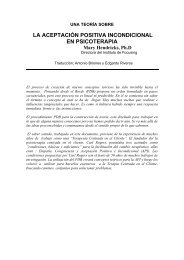8 Focusing en de experiëntiële aspecten van psychotherapie
8 Focusing en de experiëntiële aspecten van psychotherapie
8 Focusing en de experiëntiële aspecten van psychotherapie
Create successful ePaper yourself
Turn your PDF publications into a flip-book with our unique Google optimized e-Paper software.
Literatuur<br />
Grafanaki, S. (2001). What counselling research has taught us about the concept of congru<strong>en</strong>ce: Main<br />
discoveries and unresolved issues. In G. Wyatt (Red.), Rogers’ therapeutic conditions: Evolution,<br />
theory and practice. Vol. 1. Congru<strong>en</strong>ce (pp. 18-35). Ross-on-Wye, UK: PCCS Books.<br />
Grafanaki, S., & McLeod, J. (2002). Experi<strong>en</strong>tial congru<strong>en</strong>ce: qualitative analysis of cli<strong>en</strong>t and counselor<br />
narrative accounts of significant ev<strong>en</strong>ts in time-limited person-c<strong>en</strong>tred therapy. Counselling and<br />
Psychotherapy Research, 2, 20-32.<br />
Grant, B. (2004). The imperative ethical justification in psychotherapy: The special case of cli<strong>en</strong>t-c<strong>en</strong>tered<br />
therapy. Person-C<strong>en</strong>tered & Experi<strong>en</strong>tial Psychotherapies, 3, 152-165.<br />
Gre<strong>en</strong>berg, J., Solomon, S., Pyszczynski, T., Ros<strong>en</strong>blatt, A., Burling, J., Lyon, D., Simon, L. & Pinel, E. (1992).<br />
Why do people need self-esteem? Converging evid<strong>en</strong>ce that self-esteem serves an anxiety-buffering<br />
function. Journal of Personality and Social Psychology, 6, 913-922.<br />
Gre<strong>en</strong>berg, L.S. (2002). Emotion-focused therapy. Coaching cli<strong>en</strong>ts to work through their feelings. Washington,<br />
DC: APA.<br />
Gre<strong>en</strong>berg, L.S. (2004a). Being and doing: Person-c<strong>en</strong>teredness, process guidance and differ<strong>en</strong>tial<br />
treatm<strong>en</strong>t. Person-c<strong>en</strong>tered & Experi<strong>en</strong>tial Psychotherapies, 3, 52-64.<br />
Gre<strong>en</strong>berg, L.S. (2004b). Emotion-focused therapy. Clinical Psychology and Psychotherapy, 11, 3-16.<br />
Gre<strong>en</strong>berg, L.S. (2006a). Emotion-focused therapy for <strong>de</strong>pression (Part 1 &2). Washington, DC: APA Psychotherapy<br />
Vi<strong>de</strong>otape Series II.<br />
Gre<strong>en</strong>berg, L.S. (2006b). Emotion-focused therapy: A synopsis. Journal of Contemporary Psychotherapy,<br />
36, 87-93.<br />
Gre<strong>en</strong>berg, L.S., Auszra, L., & Herrmann, I.R. (2007). The relationship among emotional productivity,<br />
emotional arousal and outcome in experi<strong>en</strong>tial therapy of <strong>de</strong>pression. Psychotherapy Research, 17,<br />
482-493.<br />
Gre<strong>en</strong>berg, L.S., & Bolger, L. (2001). An emotion-focused approach to the overregulation of emotion<br />
and emotional pain. Journal of Clinical Psychology: In-Session, 57, 197-211.<br />
Gre<strong>en</strong>berg, L.S., & Elliott, R. (1997). Varieties of empathic responding. In A.C. Bohart & L.S. Gre<strong>en</strong>berg<br />
(Red.), Empathy reconsi<strong>de</strong>red. New directions in psychotherapy (pp. 167-186). Washington, D.C: American<br />
Psychological Association.<br />
Gre<strong>en</strong>berg, L.S., Elliott, R., & Lietaer, G. (1994). Research on experi<strong>en</strong>tial <strong>psychotherapie</strong>s. In A.E. Bergin<br />
& S.L. Garfield (Red.), Handbook of psychotherapy and behavior change (4th ed., pp. 509-539). New<br />
York: Wiley.<br />
Gre<strong>en</strong>berg, L.S., Elliott, R., & Lietaer, G. (2003). Humanistic-experi<strong>en</strong>tial psychotherapy. In G. Stricker<br />
& T. Widiger (Red.), Handbook of psychology. Vol. 8. Clinical Psychology (pp. 301-326). Hobok<strong>en</strong>, N.J.:<br />
Wiley.<br />
Gre<strong>en</strong>berg, L.S., Ford, C., Ald<strong>en</strong>, L., & Johnson, S. (1993). Change processes in emotionally focused therapy.<br />
Journal of Consulting and Clinical Psychology, 61, 78-84.<br />
Gre<strong>en</strong>berg L.S., & Geller, S.M. (2001). Congru<strong>en</strong>ce and therapeutic pres<strong>en</strong>ce. In G. Wyatt (Red.), Rogers’<br />
therapeutic conditions: Evolution, theory and practice. Vol. 1. Congru<strong>en</strong>ce (pp. 131-149). Ross-on-Wye,<br />
UK: PCCS Books.<br />
Gre<strong>en</strong>berg, L.S., & Goldman, R.N. (2008). Emotion-focused couples therapy: The dynamics of emotion,<br />
love, and power. Washington, DC: APA.<br />
Gre<strong>en</strong>berg, L.S., & Johnson, S.M. (1988). Emotionally focused therapy for couples. New York: Guilford.<br />
Gre<strong>en</strong>berg, L.S., Korman, L., & Paivio, S. (2002). Emotion in humanistic therapy. In D. Cain & J. Seeman<br />
(Red.), Humanistic <strong>psychotherapie</strong>s. Handbook of research and practice (pp. 499-530). Washington,<br />
D.C.: APA Press.<br />
605










